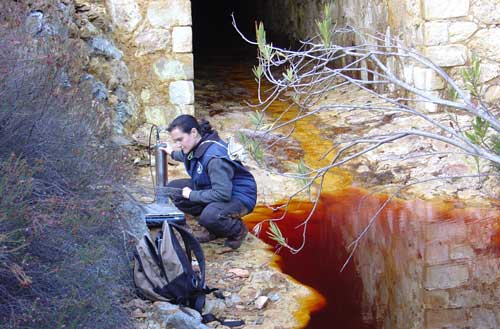Linda Amaral-Zettler Receives Fulbright Award to Study Extreme Bacteria

By Claudia Geib
The Rio Tinto, an acidic, rust-colored river flowing through the Iberian Peninsula, is often used to study the sort of extreme life that might live on Mars—so Linda Amaral-Zettler was surprised to find a potential human pathogen in the river.
Amaral-Zettler, an associate scientist at the Marine Biological Laboratory, has received a Fulbright Scholar Award to study in Portugal next year, focusing her work on the Rio Tinto. Amaral-Zettler will compare the genetic makeup of Legionella bacteria from the river to the strains that make humans ill, working at the Computational Genomics Laboratory at the Instituto Gulbenkian de Ciência near Lisbon.
“We are effectively trying to catch a pathogen in the act of becoming a pathogen,” Amaral-Zettler says.
Legionella bacteria often live in association with amoeba hosts that live in warm, fresh water. In the summer, warm weather can lead to outbreaks of Legionnaires' disease, a respiratory infection caused by inhaling water droplets containing the bacteria.
 MBL Associate Scientist Linda Amaral-Zettler has received a Fulbright Award to compare Legionella bacteria from the extremely acidic Rio Tinto river to the pathogenic strains that cause Legionnaires' disease. Above, Amaral Zettler works at the river in 2005. Credit: Erik Zettler
MBL Associate Scientist Linda Amaral-Zettler has received a Fulbright Award to compare Legionella bacteria from the extremely acidic Rio Tinto river to the pathogenic strains that cause Legionnaires' disease. Above, Amaral Zettler works at the river in 2005. Credit: Erik ZettlerAlthough the Rio Tinto is more acidic than the human stomach, genomic analyses have found a species of Legionella in the river's microbial community. This form of Legionella may be living in symbiosis with a single-celled organism, though it could also potentially be free-living.
“I am teaming up with my colleagues in Portugal and the University of Chicago to ask the questions: How could Legionella have adapted to this extreme environment, and how might Legionella be becoming a pathogen in this part of the world?” Amaral-Zettler said. “The ultimate goal is to better understand the most effective ways of treating the disease it causes.”
“Fulbright scholars are among the best and we are delighted and proud that Linda has been recognized for her extraordinary scholarship on Legionella biology. She is an outstanding scientist and richly deserving of this honor,” says Jonathan Gitlin, director of the MBL Division of Research.
Established in 1946, the Fulbright Scholar program seeks to build mutual understanding between the United States and other countries through student and professional research grants. With her award, Amaral-Zettler joins the ranks of the roughly 370,000 scholars from over 160 countries who have participated in the program. Amaral-Zettler herself is mentoring a Fulbright Ph.D. student from Morocco in her laboratory this year.
—###—
The Marine Biological Laboratory (MBL) is dedicated to scientific discovery – exploring fundamental biology, understanding marine biodiversity and the environment, and informing the human condition through research and education. Founded in Woods Hole, Massachusetts in 1888, the MBL is a private, nonprofit institution and an affiliate of the University of Chicago.